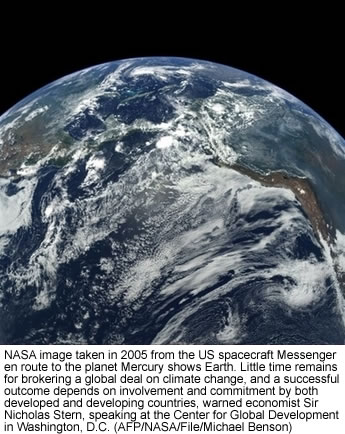Stern stressed that by 2050 — the year often used as a target for reducing global emissions — 8 billion of the global population of 9 billion will be living in developing countries. But at least 70 percent of the greenhouse gases polluting the skies today are attributable to developed countries.
If the two sides cannot overcome current disagreements and work together to stop deforestation, develop new technologies for capturing carbon in the air, and set firm targets for reducing pollution, Stern warned, the “cost of inaction will be huge and entail major risks.”
Two years ago Stern produced a controversial report on the economics of climate change, commissioned by the British government, arguing that if governments failed to invest at least 1 percent of their GDP in mitigating global warming, the end result could be a global decline in GDP of as much as 20 percent.
Yesterday, Stern acknowledged that his earlier report probably underestimated the risks and the rapidity with which global warming is taking place, meaning that governments may need to commit 2 percent of GDP to mitigating climate change.
Stern’s warnings came just a day after two other blunt warnings on the impact of climate change.
On Wednesday, 16 national intelligence agencies acknowledged in a new National Intelligence Estimate (NIE) that global climate change presents a threat to U.S. national security — perhaps the most candid assessment to surface publicly in Washington during the Bush era.
In the short term the effect in the United States will be indirect, resulting from the impact of climate change in other countries, Thomas Fingar, deputy director of National Intelligence for Analysis testified before a joint hearing of the energy and intelligence subcommittees of the House of Representatives.
Fingar stressed the likelihood of increased conflict over water, especially in drought-prone Africa, and the growing potential for famine as crops fail due to flooding and drought, leading to widespread social unrest and increased emigration.
Providing assistance to the large numbers of people affected by humanitarian disasters, he added, will gradually deplete U.S. resources.
Fingar told Congress that: “The United States depends on a smooth-functioning international system ensuring the flow of trade and market access to critical raw materials such as oil and gas, and security for its allies and partners. Climate change and climate change policies could affect all of these.”
A similar assessment came from scientist James Hansen, who told a gathering at the National Press Club that the world has reached a “tipping point” and must act swiftly and decisively to avoid disaster.
Hansen was the first U.S. scientist to warn of the dangers of climate change some 20 years ago, and is currently head of NASA’s Goddard Institute for Space Studies.
“There are tipping points in the climate system, which we are very close to” Hansen argued, “and if we pass them the dynamics of the system take over and carry you to very large changes which are out of your control.”
Hansen advocated for the phase-out of all coal-burning power plants by 2030, except those fitted to capture and bury carbon dioxide, and the imposition of taxes on coal, oil, and gas producers as a means to pressure them to reduce emissions.
Stern, meanwhile, called for a “global deal” to reduce emissions by 50 percent by 2050, with at least 80 percent of the reduction coming from the United States and Europe, and urged rapid development and dissemination of technologies that facilitate low-carbon growth in developing countries that rely on fossil fuels.
“It is possible to move to zero-carbon solutions,” Stern said, citing shifts that occurred in France, Germany, and Brazil following the oil crisis of the late 1970s.
But, he added, action is required urgently in each and every country. “We need more pressure from below and more leadership” at the top.
Copyright © 2008 OneWorld.net.

